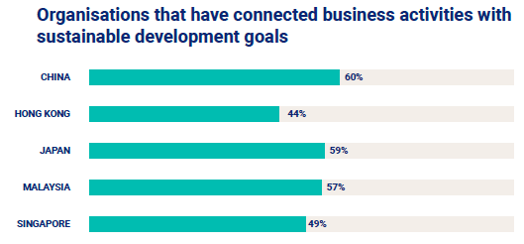Sustainability Matters: How Hays Can Help Your Business and Career Flourish in This Booming Industry

Sustainability is one of the crucial matters for both companies and individuals. According to the "2023 Hays Asia Salary Guide" survey, 47% of Japanese companies conduct sustainability reporting, and 59% associate their business activities with Sustainable Development Goals (SDGs). Furthermore, 93% of people consider a company's commitment to sustainability to be important, and it has become an increasingly influential factor when contemplating a job change.


As a global company, Hays has been passionate about sustainability for many years, and in this article, we explain why we remain committed to it, both as part of our own corporate culture and our recruitment activities.
Senior Business Manager, James Knight, is driving the sustainability recruitment initiative in Japan and provides an insight into future market trends and answers questions below.
Q. What initiatives has Hays undertaken in the field of sustainability? What is our commitment to sustainability and how do we pursue it?
Climate change is one of the defining issues of our time. The targets set out in the Paris Agreement are important for the future of our planet and having achieved our first goal of becoming a carbon-neutral business in 2021, Hays’ next aim is to be the first global company in our sector to reach Net Zero. We have set a target of reducing our GHG emissions by 50%, versus a base year of 2020, by 2025. Some of the measures we’ve taken to achieve this goal include, reducing flights by 40% by 2025, a material reduction in business driving miles, using renewable energy in our offices and moving from desktop computers to laptops.
Q. What was the reasoning behind Hays' decision to focus on Sustainability recruitment in Japan?
We’ve seen an increase in environmental awareness, translating to increased hiring activity in this sector. There are now multiple roles being advertised, with clients and candidates becoming more conscious of this area of business. We need to better align ourselves with this trend, in order to support the recruitment needs of our clients, as well as the career objectives of our candidates.
Q. Could you provide insight into the current state of the Sustainability market? What are the expected future trends and developments?
We have witnessed growth in the Consulting, Building Management, and Finance sectors with others (such as Life Sciences and consumer goods) expected to follow. Renewable energy companies are also rising in prominence, as public sustainability commitments and private investment rises. Manufacturing, Engineering, and Construction companies are firmly in the spotlight too, as efforts to improve the energy consumption and efficiency of their buildings continue. Most ESG initiatives have so far focused on the ‘Environmental’ aspect, with these positive developments spurring initiatives in the ‘Social’ and ‘Governance’ pillars too. The shortage of talent with the right experience and skill set remains a challenge.
Q. How do we contribute to our clients as a life-long partner?
A key aspect of Hays’s Sustainability strategy is our approach to partnerships. Hays keeps our clients informed of our Net Zero commitments and enquires about their own plans. Clients may increasingly express a preference for working with partners also on a Net Zero journey, so this helps ensure we are well aligned. Going further, Hays also actively seeks out clients that are committed to a greener, more sustainable direction.
Q. In a skills-short market, how do we identify and attract the right candidates for Sustainability positions?
Given the sector’s relative immaturity in Japan at present (compared with markets such as the US and Europe), there is an inevitable shortage of qualified candidates domestically. Thus, for the moment at least, organisations will likely need to consider the transferability of skills, rather than only seeking qualified and experienced Sustainability candidates.
Q. How can we inspire and encourage candidates to pursue and advance their careers in the Sustainability field?
Organisations are already showing greater flexibility when looking for suitable skills matches, so there are opportunities for candidates who have relevant, transferable skills, as well as for more experienced candidates. We support professionals at all levels, who are willing to develop a career in Sustainability and ESG.
Q. If I'm seeking a job related to Sustainability & ESG, what steps can I take to develop my career in this field?
As organisations place greater emphasis on sustainability and the practices that come with it, there are more and more opportunities for candidates to carve out a career in this field. Fiona Place, Group Head of Sustainability at Hays, started her career at a Risk Advisory firm. She then worked across multiple disciplines, including carbon management, responsible procurement, and the emerging field at the time of ESG.
Regarding relevant skills and experience for success, at junior-mid level, consulting and analysis, financial reporting, presentation, and communication skills (as well as engineering) are especially useful. Senior-level roles will require prior experience in Sustainability and/or ESG, or areas closely related to these, such as CSR, for example. Such roles may also demand a qualification in a relevant subject.
Candidates should typically be fluent in both Japanese and English and demonstrate flexibility and adaptability, as many Sustainability teams/departments will still be relatively new and growing. Senior roles will also require people management and leadership skills in most cases.
If you are a client planning on developing Sustainability as part of your business strategy, Hays Specialist Recruitment can help you to find the right people. Similarly, if you are a candidate seeking career advice and planning to grow your career, we can assist you. Please click here for further information.
Related Articles:


